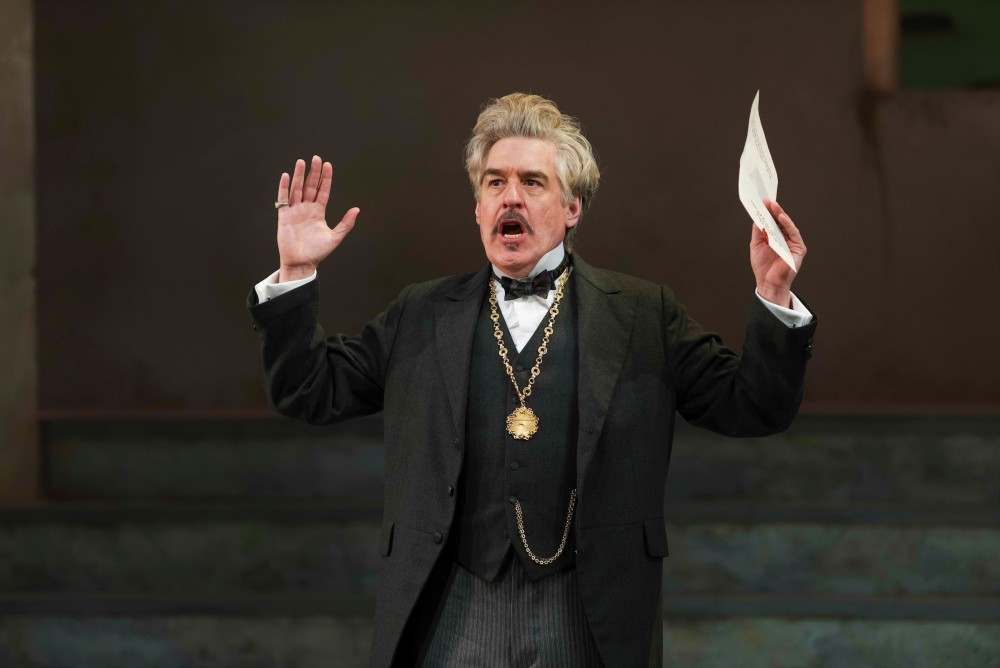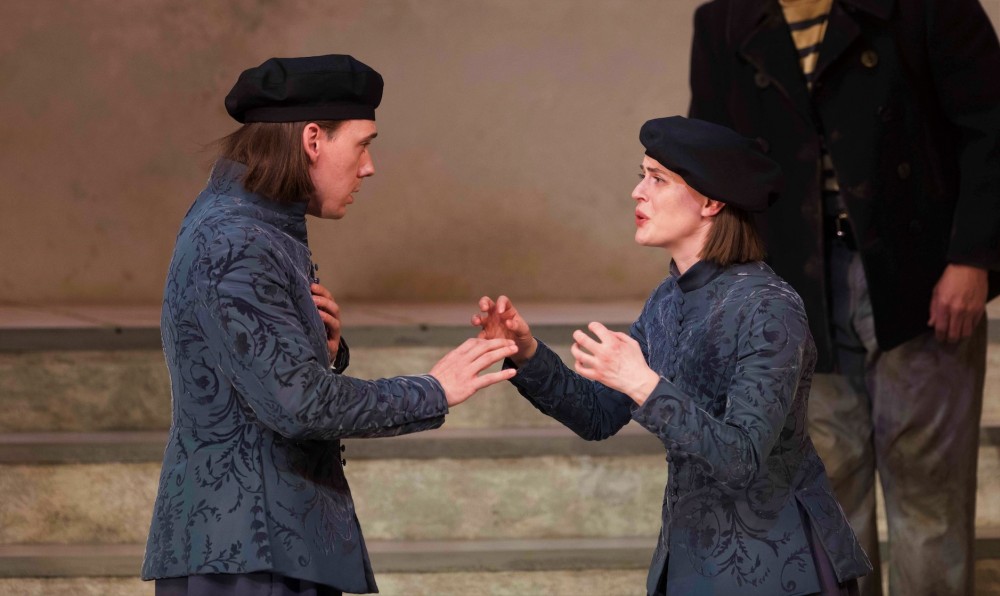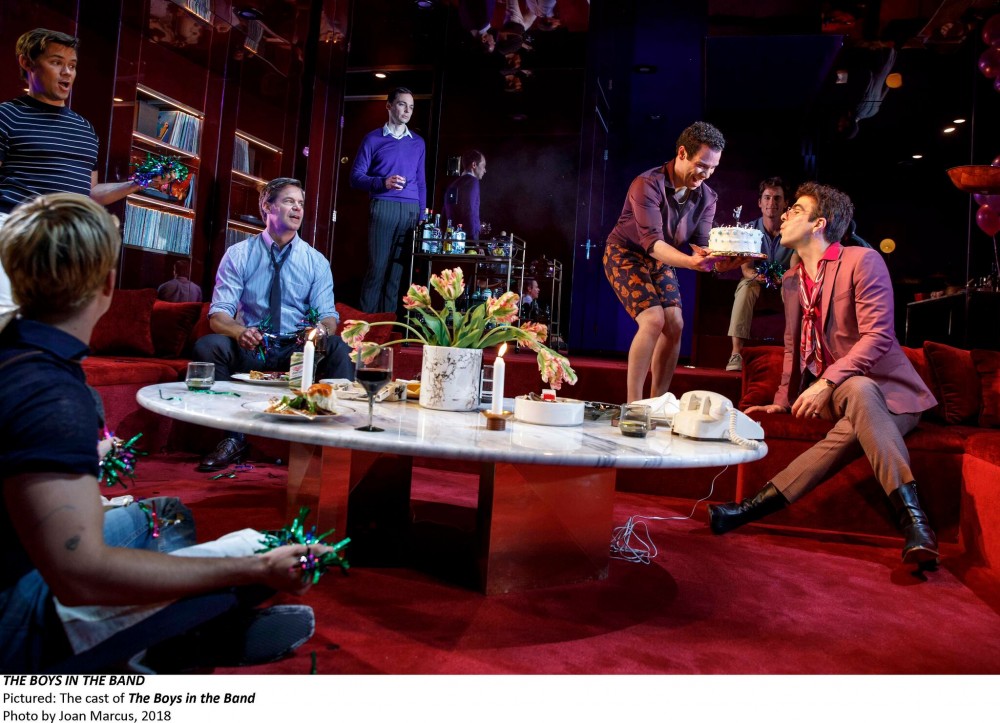
** Michael Gotch, Kate Forbes, Mic Mataresse, Lee E. Ernst
by JK Clarke
Comedy is hard. Especially theatrical comedy. Even if the humor exists in the script, it doesn’t necessarily make it to the stage. Ordinarily, William Shakespeare’s comic masterpiece, Twelfth Night, is a sure bet for a night of guffaws. But this season I’ve seen two versions—at theaters reputed for their excellent Shakespeare productions, no less—that flatlined right from the opening curtain. The first, last December, by Fiasco Theater Company at CSC, eschewed farce in favor of allowing members of the ensemble to “explore their musical identities,” for some reason. Now it’s The Acting Company (a Julliard affiliate) and Resident Ensemble Player’s (University of Delaware) version as producers of Twelfth Night at Theater for a New Audience’s Polonsky Shakespeare Center, which also misses the laughs and feels like a community theater effort, despite skilled straightforward acting.
Most are familiar with the story of siblings, Viola (Susanna Stahlmann) and Sebastian (John Skelley), separated in a devastating shipwreck, each presuming the other has perished, but both winding up in Illyria (a kingdom on the coast of the Adriatic). Viola, for safety’s sake, takes the guise of a young man, Cesario, and finds employ as the serving man to Orsino, Duke of Illyria (Matthew Greer). Orsino, in love with the Countess Olivia (Elizabeth Heflin), deep in mourning over the loss of both her father and brother, is refusing all suitors, so Cesario is sent to woo on his behalf. This being an outrageous farce, Olivia (of course) falls for Cesario, who is neither who nor what he seems.


* Stephen Pelinski
Twelfth Night’s subplot revolves around the characters in Olivia’s household, and this is where the ribald humor usually comes in. Countess Olivia’s uncle, Sir Toby Belch (Lee E. Ernst), is a bon vivant, or drunk, depending on who you are to him. His henchmen, Sir Andrew Aguecheek (Michael Gotch, looking the part rather well), Olivia’s servant, Fabian (Mic Matarrese), as well as Maria (Kate Forbes), Olivia’s lady-in-waiting, take great delight in his company and unite against his enemy, Olivia’s steward Malvolio (Stephen Pelinski), who in Shakespeare’s time represented Puritan austerity and distaste for merriment in general. The contrast between the “ordinary folk” represented by Sir Toby, et al, and the religious severity of Malvolio ordinarily creates a high-contrast tension that results in humor. However, under the direction of Maria Aitken (Tony nominee for directing for 2008’s The 39 Steps), that tension is nowhere to be found in this production.
When Malvolio, who has threatened to have Sir Toby expelled from the household, is tricked by Maria’s forged letter expressing “Olivia’s” love for Malvolio—one of the more classic comic moments in the history of theater—the letter’s suggestion that he change his fashion and attitude in order to please her, his transformation is almost negligible. He begins the play with an inexplicable bouffant hairdo more reminiscent of a bejewelled Buster Poindexter than a frigid Puritan; what he “becomes” for Olivia’s sake, is scarcely different than what he was. When he reads the planted letter, the conspirators hidden away in the nearby box tree—Aguecheek in particular—look more bored than titillated—the scene is complete devoid of comic tension. The lack of extremes on either side of the equation—the merry aren’t terribly merry, the austere don’t seem that uptight—pretty well set the tone for the entire play.


** Joshua David Robinson
It’s a pity, too, for most of the basic elements of the play are in place. Candice Donnelly’s Victorian cum Vaudeville costumes are prettily done, though strangely contraindicated by Lee Savage’s contemporary Mediterranean set design. It’s hard to suss out any particular reason for not sticking with a period and/or for marrying these two. And as Feste the clown, Joshua David Robinson’s performance initially offered a lot of promise for the play than was delivered.
Obviously, not every production can be a hit. However, the reason an organization like Theater for a New Audience would trot out a production of a well-loved and some would say over-produced play like Twelfth Night (in fact, a musical version will be the second offering for this summer’s Shakespeare in the Park by The Public Theater, making it the third major production in the last year in New York City), is to help sell tickets and subscriptions. They already have an amazing track record with the Bard at the Polonsky Shakespeare Center, from this season’s wondrous The Winter’s Tale to last year’s brilliant Measure for Measure as well as hidden gems like Pericles. That they would allow the failure of a “sure thing” in the form of this lackluster Twelfth Night is nothing short of mystifying.
Twelfth Night. Through May 27 – produced by The Acting Company (a Julliard affiliate) and Resident Ensemble Player’s (University of Delaware) at Theatre For a New Audience’s Polonsky Shakespeare Center (262 Ashland Place, Brooklyn). Two hours, 30 minutes – one intermission. www.tfana.org
Photos: *Evan Crape & **Richard Termine






















